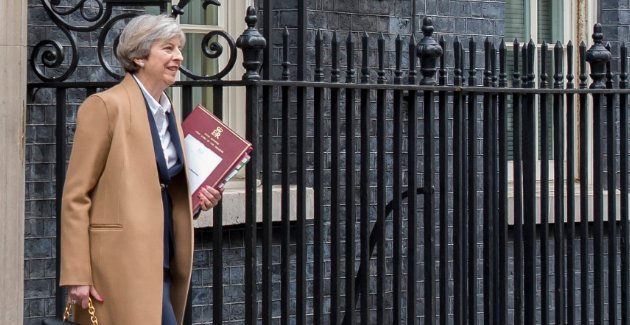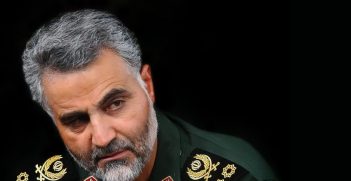May’s Master Stroke

By calling an early election for June, British Prime Minister Theresa May has not only surprised political observers but also cunningly ensured her own hold on power during the upcoming Brexit negotiations. With an increased parliamentary majority, she will be free to negotiate whatever deal she can in Brussels.
Shakespeare would have enjoyed the secret, cunning plot by Theresa May to break her many pledges and call a British election for 8 June. The cavalier way she obtained, through a boisterous 90-minute debate in parliament, a huge majority to overturn a law preventing such a possibility was itself a drama.
The bard could not have anticipated the next Machiavellian twist. May has grounded Boris Johnson, her irrepressible court jester and foreign secretary, ordering him to stomp the country as campaign ‘vocalist’ under the disciplined and formidable tutelage of Australian strategist, Sir Linton Crosby. Crosby was knighted last year after his stunning 2015 campaign to re-elect David Cameron; it was Cameron’s resignation after the referendum fiasco that led to May’s arrival in Downing Street.
There are two schools of thought explaining May’s election decision. First, by increasing the Conservatives’ majority over a weak Labour party, she gains her own mandate to negotiate a hard Brexit with the European Union. A bigger majority would mean parliament couldn’t block a settlement with Brussels.
Support for this theory came from the prime minister’s own statement: “Our opponents believe that because the government’s majority is so small, our resolve will weaken and that they can force us to change course,” she said.
The contrary argument put by newspapers such as The Times and the Financial Times—and the reason the sterling strengthened this week—is that May has softened her negotiating stance. Advisers, including her chancellor, say a soft Brexit is in Britain’s interests and can only be achieved by concessions to EU negotiators. This would infuriate the Tory right, including former and present cabinet ministers John ‘Vulcan’ Redwood, Iain Duncan-Smith, Liam Fox, and, of course, Boris Johnson.
May’s speech also provides evidence for this viewpoint: she said she sought “a deep and special partnership with a strong and successful European Union”.
It might be helpful to describe briefly the main difference between a hard and a soft Brexit. A very hard Brexit—what May herself described as “no deal being better than a bad deal”—would mean Britain leaving the EU in March 2019 with no trade agreement, no agreement on immigration and a bagful of other serious problems. These would include debt to the EU of about £80 billion (AU$136 billion) and the City of London, the major UK exporter earner, being ‘hung out to dry’. A soft Brexit would leave the UK within the European customs union, continuing to contribute to its budget, and give some freedom of movement for European citizens, as currently exists in non-member Switzerland.
These definitions are a simplification of a very tricky negotiation with many moving parts, not least of which include the French and German elections. There are other issues, which some wrongly consider peripheral, like the challenges posed to the EU by a resurgent Russia, the future of NATO, complications in Scotland and Northern Ireland, and the future of the EU budget.
The Brexit campaign was about “taking back control” but the European Commission’s negotiating document clarifies what most of us knew already: that even sovereignty has its limits. The EU also claims to have “taken back control”.
In her nine months as prime minister, May has illustrated very clearly that she is something of a control freak, along with her joint chiefs of staff, Nick Timothy and Fiona Nash. When the doyen of broadcast political editors, Sky News’ Adam Boulton made an aside remark about May looking tired and pale, Nash tweeted, “Tell Bunter he should watch what he is saying about my boss’s health … we will be making a formal complaint.”
The prime minister says she made her decision while on an Easter walking holiday with her husband Philip. That’s unlikely. May is anything but impulsive. The covert strategy will have been talked about since Christmas, but within a very tight circle. Most cabinet ministers, including Johnson, had less than 24 hours’ notice.
The conclusion is that, like most political leaders, May wants to extend power and has taken a safe political bet. The only sure way is to gain a five-year term at a time when a decisive victory is hers for the taking. Had she waited until the original election date four years hence, to which she had pledged, she almost certainly would have presided over a national health service in an even worse state than it is now, a wilting economy and a disgruntled public.
Some Britons may—like social media’s much-touted Brenda—be annoyed at disruption to early fetes and flower shows but, come 8 June, May is likely to more than double her majority at the expense of Labour. The europhile Liberals will win back some seats, the UK Independence Party will be obliterated and the Scottish Nationalists will remain, well, Scottish.
May will be free to negotiate whatever deal she can in Brussels, hopefully a compromise that may enrage both the Tory right and those who voted to remain in the EU. It is now the sensible course, and it is perhaps significant that in the parliamentary debate the prime minister would not be drawn into making a commitment on future EU migration numbers.
If she wins her bigger majority, she will be secure in the knowledge that neither wing of her party nor the House of Lords will be able to impede her. She will be truly in charge. She will dominate any Westminster discussion when she ‘brings home the bacon’. As the Financial Times’ Janan Ganesh put it: “Any angry voters will have to wait years to punish her, by which time she may have retired to a nice life of rural hikes and Ottolenghi recipes.”
Britain is certainly now leaving the European Union. Last month I thought that May would struggle to get a deal with the EU, get it through Westminister and achieve her ambitious domestic agenda. But then, I had believed her when she said she would not call a snap election. How stupid was that?
Colin Chapman is immediate past president of AIIA NSW. As a former economic correspondent at the BBC and a senior executive at the Financial Times, he spent much time in Brussels covering EU issues and still maintains close connections with policymakers.
This article is published under a Creative Commons Licence and may be republished with attribution.





